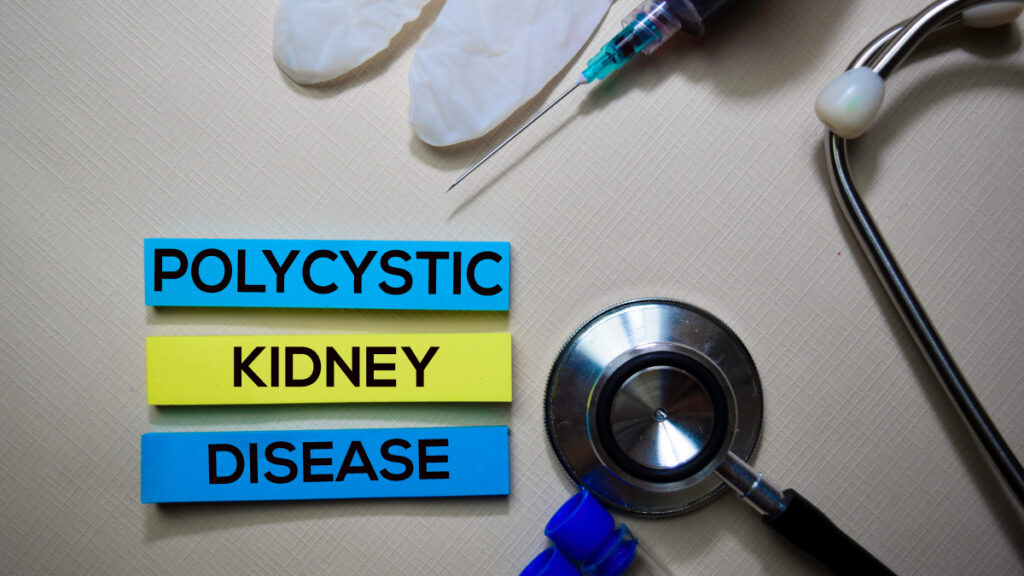
OVERVIEW
Polycystic kidney disease (PKD), also called polycystic kidney syndrome, is a genetic disorder where numerous cysts form within the kidney. Cysts are fluid-filled sacs of varying sizes. In PKD, these cysts gradually increase, causing an overall increase in kidney size.
Cysts in polycystic kidney disease are non-malignant, and they arise due to abnormalities in the renal tubules. They appear either when the baby is still in the womb, in childhood or in adulthood. These enlarged cysts cause a decline in kidney function, leading to chronic kidney disease (CKD) and kidney failure.
Polycystic kidney disease should not be mistaken for simple kidney cysts. While PKD is inherited and very harmful, simple kidney cysts are acquired and are relatively harmless. Simple kidney cysts arise in the presence of another kidney disease.
KEY FACTS
- Polycystic kidney disease is a significant cause of chronic kidney disease(CKD).
- PKD is of two types: autosomal dominant polycystic kidney disease or autosomal recessive polycystic kidney disease.
- The cysts in PKD are not confined to the kidneys alone. They spread to the liver, pancreas and testes (in males), causing liver cysts, pancreatic cysts or testicular cysts.
- Polycystic kidney syndrome is a common genetic disorder affecting people of all ages and races. It occurs in an equal ratio of males and females.
- Symptoms of PKD usually appear long after cysts develop. Symptoms include back pain, headache, and frequent urination.
- There is no cure for polycystic kidney disease. Managing symptoms to reduce complications is the treatment plan.
TYPES
There are two types of polycystic kidney disease, depending on the inheritance pattern of the disease.
- Autosomal dominant polycystic kidney disease: Autosomal dominant polycystic kidney disease (ADPKD) is the most common type. It accounts for 90% of cases of PKD. One parent with ADPKD is enough to transfer the ADPKD gene to an offspring. There is a 50% chance of a parent with ADPKD passing it on to an offspring. Autosomal dominant polycystic kidney disease (ADPKD) is known as adult PKD because symptoms usually present in adulthood, between 30-40 years of age. In ADPKD, symptoms could present in early childhood. As a result, there is limited use of the term adult PKD to describe this type of PKD.
- Autosomal recessive polycystic kidney disease: Autosomal recessive polycystic kidney disease (ARPKD) is the less common type of PKD. ARPKD is also known as infantile polycystic kidney disease. Symptoms present at birth or when the child is in the uterus. Both parents must be carriers of the ARPKD gene to pass it on to an offspring. There is a 25% chance of ARPKD gene transfer to each child when both parents are carriers. Symptoms are not seen in carriers but are present in children with the disease.
SYMPTOMS
Polycystic kidney disease symptoms depend on the type of PKD. Someone with ADPKD might not know that they carry the disease because symptoms usually do not present as cysts develop. The symptoms become apparent when cysts grow to about one inch, which could take years from the time cysts first develop.
Symptoms of ADPKD include:
- Pain in the back and flanks
- Abdominal fullness
- Haematuria (presence of blood in urine)
- Headaches
- Frequent passage of urine
- Elevated blood pressure
- Urinary tract infection
- Kidney stones
In most cases of ARPKD, symptoms develop in early life. In very severe cases, newborns die shortly after birth. It is only in a few instances that symptoms develop during late childhood. Symptoms of ARPKD are:
- Enlarged kidney size inutero
- Poor growth in the uterus (growth failure)
- Frequent passage of urine in childhood or adulthood
- High blood pressure
DIAGNOSIS
Imaging tests are the most common diagnostic tools used by nephrologists to diagnose PKD. Good family history taking helps make a polycystic kidney disease diagnosis. Diagnostic methods of polycystic kidney disease include:
- Kidney ultrasound
- C.T. scan
- MRI
- Genetic testing to check for mutation
- Liver ultrasound, especially for ARPKD, to check for liver scarring
CAUSES
Genetic mutation is the primary cause of polycystic kidney disease. Parents transfer the mutated gene to their children either in the dominant or recessive form, causing either ADPKD or ARPKD, depending on the inherited condition.
In a few cases, PKD arises due to spontaneous mutation. This type is acquired cystic kidney disease (ACKD). It occurs later in life and is not inherited. It usually occurs in patients with other kidney diseases, especially patients on dialysis.
COMPLICATIONS
Polycystic kidney disease, without proper management, can lead to the following complications:
- Aortic or brain aneurysm
- High blood pressure (hypertension)
- Liver cysts
- Anaemia
- Colon diverticula (pouches in the colon wall)
- Pancreatic and testicular cysts
PREVENTION
Polycystic kidney disease has no preventive measures. Once a person is born with the mutated gene, the condition is bound to develop at some point. A good and healthy lifestyle will help limit the complications of the disease.
If an individual with PKD seeks to have children, a genetic counsellor must help assess the likelihood of transferring the defective gene to the child.
TYPICAL TREATMENTS
PKD does not have any definitive cure. The treatment regimen is symptomatic management to reduce complications and improve life.
Typical treatment methods include:
- Antihypertensives lower blood pressure, reducing the risk of stroke and other cardiovascular complications.
- Eating foods containing low sodium helps maintain blood pressure.
- Antibiotics help to combat urinary tract infections.
- Pain relief to ease the pain. People with PKD should not take some pain relief medications like ibuprofen because they worsen the disease condition.
- Infants are placed on growth hormone therapy to correct growth failure and aid their growth.
- Surgery to drain out fluid-filled cysts and bring relief.
- Patients with PKD undergo diuresis and possible kidney transplant in the advent of kidney failure.
- Tolvaptan is a drug used to treat ADPKD It slows down the disease progression.
Lifestyle habits that will help a person with PKD manage the disease include:
- Regular exercise
- Eating balanced diet
- Stop smoking
- Weight management
- Reducing stress
CONCLUSION
Polycystic kidney disease is an inherited condition where numerous cysts form within the kidneys. It is more common in adults but also affects children.
Anyone who observes any PKD symptom must visit a doctor for diagnosis and proper management.
Most PKD cases will require dialysis and possible kidney transplant. Proper management and a healthy lifestyle are needed to cope with the disease, as there is no cure.
MOST COMMON






